| Srl | Item |
| 1 |
ID:
123091
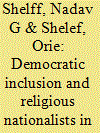

|
|
|
|
|
| Publication |
2013.
|
| Summary/Abstract |
NADAV G. SHELEF and ORIE SHELEF discuss the voting behavior of Israeli religious nationalists in the elections of 1999 and 2009. Their analysis suggests that the democratic inclusion of radical movements may not lead to moderation.
|
|
|
|
|
|
|
|
|
|
|
|
|
|
|
|
| 2 |
ID:
084519
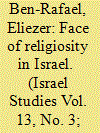

|
|
|
| 3 |
ID:
160943
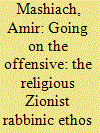

|
|
|
|
|
| Summary/Abstract |
This article examines some of the conceptual changes taking place in religious Zionist thinking in the course of the last three decades, as expressed in the writings of Judea and Samaria rabbis. The Halachic literature produced by these rabbis reinforces the offensive Jewish‒Israeli ethos, a sea change from Halachic texts composed by Diaspora Jews. From the theological point of view, this change is part of the return to the days of biblical-Jewish identity; from an ideological point of view, it is part of the reaction against the post-heroic culture that has infiltrated the IDF and the desire to influence this conceptual retreat from within.
|
|
|
|
|
|
|
|
|
|
|
|
|
|
|
|
| 4 |
ID:
146857
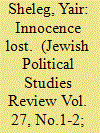

|
|
|
|
|
| Contents |
The disengagement from the Gaza Strip and parts of Northern Samaria in 2005 affected the religious Zionist public more than other sectors of Israeli society because most of the settlers are religious Zionists. Yair Sheleg examines the changes among religious Zionists during the decade since the disengagement. He discusses the question whether such changes were the direct results of the disengagement or could be attributed to general trends in Israeli society. The article focuses upon five major attitudes of the religious Zionists that underwent changes, as follows: the attitude toward the state; toward the authorities; toward religious faith; toward political opponents and toward the Arabs. Sheleg notes a more critical attitude toward the state, a distancing from formerly esteemed rabbis and political figures, a tendency toward spirituality and less institutionalized faith, harsher language against the Left and an increase in attacks against Arabs. Despite the above, loyalty to the State of Israel remains steadfast, along with a willingness to contribute to society and no major loss of religious faith.
|
|
|
|
|
|
|
|
|
|
|
|
|
|
|
|
| 5 |
ID:
178300
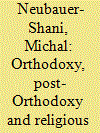

|
|
|
|
|
| Summary/Abstract |
Gender equality in the synagogue space gained momentum and engendered a discourse among religious feminist women in recent decades. In Israel this was accompanied by the harbingers of separate women’s gatherings for prayers and supplication among women of varied backgrounds. This gave rise to the notion of feminine thought in the world of Jewish prayer as opposed to a precise facsimile of men’s prayer. The article focuses on the ‘Shirat Rivka’ prayer group in the Neve-Daniel locality (Gush-Etzion) as a unique case study in this context. It examines the group’s characteristics as a manifestation of Post-Orthodoxy and Orthodox Feminism and offers a new prototype of women’s prayer that enables Orthodox women who do not necessarily view themselves as part of the feminist revolution to be active in this sphere.
|
|
|
|
|
|
|
|
|
|
|
|
|
|
|
|
| 6 |
ID:
175464
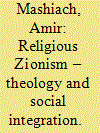

|
|
|
|
|
| Summary/Abstract |
This article explores the theology behind the integration of religious Zionists in all spheres of activity in Israel, from commerce and industry to agriculture, academia, and the defence establishment. It argues that religious Zionism is not a combination of religiosity and Zionism but a movement motivated by a distinct theology of integration that espouses a combination of Torah and work, not as part of one’s natural duties to support one’s family but as an integral part of one’s religious duties.
|
|
|
|
|
|
|
|
|
|
|
|
|
|
|
|
| 7 |
ID:
187561
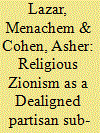

|
|
|
|
|
| Summary/Abstract |
During the second decade of the twenty-first century, Israel’s Religious Zionist camp has undergone a process of accelerated Dealignment of its partisan system, resulting in the transformation of the political parties comprising it into a Dealigned Partisan Subsystem. An example of this process can be found in the transformations that took place in the ‘Jewish Home’ Religious-Zionist political party led by Naftali Bennett. Within 9 years and seven election campaigns, the party succeeded in trying out the Open Camp Party model, experiencing a division led by Bennett himself, and finally reaching the verge of disappearing and once again initiating renewed revival attempts. The Dealignment of partisan systems includes a high level of voters’ mobility; a decline in the support of existing mainstream parties; a decline in voting rates; and a decline in the strength of partisan identification, while voting patterns become more personal. The partisan system itself changes during this stage, with old parties disappearing and others rising in their place, often only to disappear from the political map as quickly as they appeared. This article illustrates the extent to which the Religious-Zionist partisan subsystem in Israeli politics during the second decade of the twenty-first century until the 2022 elections campaign corresponds with most characteristics of a Dealigned system.
|
|
|
|
|
|
|
|
|
|
|
|
|
|
|
|
| 8 |
ID:
137546
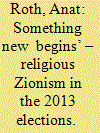

|
|
|
|
|
| Summary/Abstract |
Habayit Hayehudi party was one of the most noteworthy phenomena of the general elections held in Israel in 2013. In the 2009 elections the party's main predecessor only won three seats, and polls conducted in the first half of 2012 cast doubt upon its chances of passing the minimum threshold. Defying these predictions, Habayit Hayehudi won 12 seats to become the fourth largest Knesset party. This article's primary claim is that the party's success derived from its leaders' ability to cater to the aspirations and needs ensuing from the traumatic 2005 Gaza disengagement and to replace the feelings of distress and disorientation with a positive momentum.
|
|
|
|
|
|
|
|
|
|
|
|
|
|
|
|
| 9 |
ID:
118541
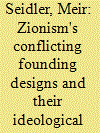

|
|
|
|
|
| Publication |
2012.
|
| Summary/Abstract |
The article deals with two different approaches to the Zionist enterprise that clearly dominated nearly all of the stages of its development: viewing any envisioned return of the Jews to the Land of Israel through a traditional redemptionist prism and a novel perception seeking refuge for a persecuted people. Though the historical schism and the ideological gap between both perceptions are obvious, I try to demonstrate that in terms of real-life ideologies they at times worked hand in hand. The refuge position was neither the exclusive domain of secular Zionists, nor was its redemptionist counterpart limited to the proponents of religious Zionism. Sometimes both positions are echoed by one and the same person. Furthermore, an intermediate position is presented and the reasons for its meager success are scrutinized. The main protagonists here are Herzl, Rabbi Kook, Rabbi Reines, and Ahad Ha'am.
|
|
|
|
|
|
|
|
|
|
|
|
|
|
|
|